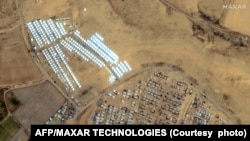Fears have been rising that Israeli Prime Minister Benjamin Netanyahu will soon follow through on repeated threats to send troops into Rafah, where 1.5 million people have sought shelter, many in makeshift encampments.
"Everybody seems to be on a countdown to war across the largest displacement camp on earth, which is Rafah," Norwegian Refugee Council chief Jan Egeland told AFP.
Egeland warned that a ground assault on Rafah would be an "apocalyptic situation" and that humanitarian groups "are completely in the dark on how to mitigate this countdown to a catastrophe."
Also on Tuesday, the United Nations rights office said it was "horrified" at reports of mass graves found at the Gaza Strip's two biggest hospitals after Israeli sieges and raids.
Israel has repeatedly targeted medical facilities in Gaza during the war, accusing Hamas, the Palestinian militant group, of using them as command centers and to hold hostages abducted on October 7. Hamas denies the accusation.
Gaza's Civil Defense agency said nearly 340 bodies were uncovered in the past three days of people killed and buried by Israeli forces at the Nasser Hospital in the southern city of Khan Younis.
Israel's army responded by saying that claims it had buried Palestinian bodies were "baseless and unfounded," without directly addressing allegations that Israeli troops were behind the killings.
The army said that "corpses buried by Palestinians" had been examined by Israeli troops searching for hostages and then "returned to their place."
U.N. rights chief Volker Turk called for an "independent" probe into the deaths at Nasser and Gaza City's Al-Shifa hospitals, noting the "special protection" awarded to medical facilities under international law.
Global outrage
Outcry has been growing around the world against Israel's offensive, which has turned vast areas of Gaza to rubble and sparked fears of famine.
Hundreds of students have been arrested in recent days at pro-Palestinian demonstrations on the campuses of prominent university campuses in the United States, Israel's top ally and military supplier.
In Gaza, the United Nations says "multiple obstacles" continue to impede delivery of urgently needed aid for Palestinians in Gaza desperate for food, water, shelter and medicine.
But Netanyahu has vowed to press on with a planned offensive on Rafah, on the besieged territory's border with Egypt.
Citing Egyptian officials briefed on the Israeli plans, the Wall Street Journal said Israel was planning to move civilians from Rafah to nearby Khan Younis over a period of two to three weeks.
Satellite images shared by Maxar Technologies showed tent camps that had recently been set up in that area.
The Journal reported that Israel would then send troops into Rafah gradually, targeting areas where Hamas's leaders are thought to be hiding, in a military operation that would last six weeks.
But humanitarian workers have no knowledge of any evacuation plans, Red Cross official Fabrizio Carboni said.
"There is no condition for a military operation without devastating humanitarian consequences" in Rafah, Carboni told AFP.










Forum